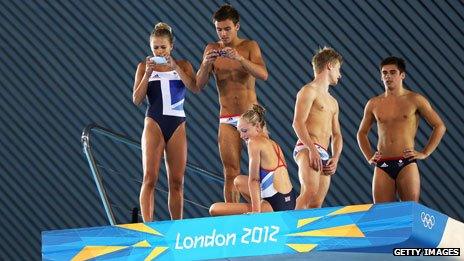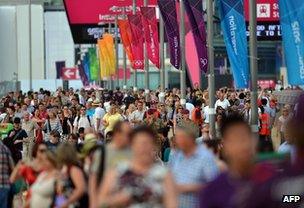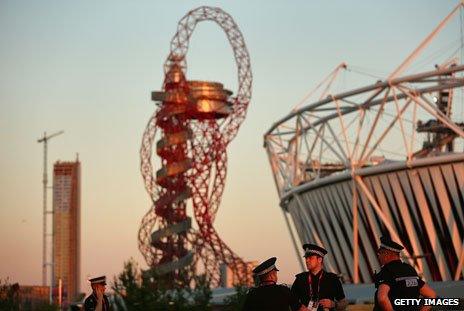Can mobile phone networks cope with the Olympics?
- Published
- comments

Finally, the day has come. After years of planning and building and a very sizeable investment, we will now find out whether it's been worthwhile. I'm talking, of course about the UK's mobile phone networks which will come under huge strain as the Olympics get underway.
As the opening ceremony starts at 21:00 BST, thousands of people at the Olympic Park and millions across the UK will be texting, tweeting and uploading photos at an unprecedented rate. Some years back, the regulator Ofcom expressed concern as to whether the networks would buckle under pressure.
But, thanks to an unusual degree of co-operation between the big mobile operators and BT - the communications partner for London 2012 - they seem sure that they can meet the challenge.
Ofcom's Ed Richards has recently expressed confidence that the networks have got their act together.
At the Olympic Park in Stratford, 30 extra phone masts have been installed to be shared between the operators, so that the spectators, athletes and organisers should all be able to use smartphones at once.
But the hope is that many will use the wi-fi zones installed by BT.
It's described as the largest single wi-fi installation ever in the UK, capable of handling more users than any other project before. BT says it is expecting peak traffic on the park of 1.7Gbps - the equivalent of 100 pictures a second from an iPhone 4S.

Most will take phones to the Games
Then there's the wider challenge of making sure there is enough mobile and fixed broadband capacity across London and the rest of the UK, as people at home react to what is happening, sharing texts, social media updates and pictures.
The co-ordinating group bringing BT and the mobile operators together is run by Stuart Newstead.
I caught up with him and asked if he was confident that all would go according to plan. He told me that while there would of course be many thousands of people all trying to use the networks from the opening ceremony, he felt that the traffic across the capital and the rest of the UK would not be unmanageable.
"I'm pretty confident it will be like a regular busy day - something like the Royal Wedding last year."

Extra masts and wi-fi zones have been installed
He thought a bigger challenge might come later in the Games.
"Think of next Friday, when the athletics start, when the rowing and the cycling and the swimming are still underway, and people are communicating from all sorts of venues at once." But he remained calmly confident. "We're as prepared as we can be."
One man who will be watching very carefully is David Cleevely, a veteran of the telecoms industry who is running an interesting research project. His company Cambridge Radio Frequency Services has installed monitoring equipment at a number of houses across the London area, mine included, to see what happens to the mobile networks over a six-month period.
He thinks there will be some difficulties in getting texts and pictures out of the Olympic Park on Friday night, but we should not be too dismayed.
"It already happens at any major sporting event where you get thousands of people online at the same time. The networks won't go down - you just have to accept that occasionally you'll have difficulties connecting with your mobile phone."
The wider question many will ask, though, is that if the networks do manage to provide decent coverage at the Olympics, why can't they do it the rest of the time?
Preliminary results from the mast Mr Cleevely has attached to my home suggest that at least one mobile network is virtually useless indoors.
With Ofcom making it a condition of the 4G auction that indoor coverage is available to 98% of the population by 2017, there will have to be plenty of investment in new masts once the Olympics are over.